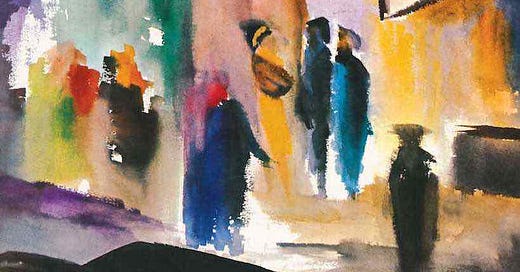When assessing the songs on the Acclaimed Music list - I considered skipping this and any other live albums and focusing only on studio albums. There are no other live albums in the top 100, only The Allman Brothers Band’s At Fillmore East and Johnny Cash’s Live At Folsom Prison in the top 250. I decided to be pure and include James Brown and The Famous Flames’ Live At The Apollo on the account there’s little debate that it is the most acclaimed live album of all time. We mentioned the Rolling Stone Top 500 albums last time out - it was #65 on that and #25 on the 2003 and 2012 versions. In 2015 the same magazine straight out slapped the Greatest Live Album of All Time on it.
‘Night Train’ was first recorded by Jimmy Forrest in 1951, but the riff is older than that - first recorded in 1940 by a band led by Duke Ellington. Forrest was part of Ellington’s band while performing the riff as "Happy-Go-Lucky Local". Forest went and forged his path and recorded his version.
When it comes to the James Brown version, he recorded it with his band, The Famous Flames,1 in 1961. He removed the lyrics, credited to Lewis P. Simpkins from 1952, a somewhat generic blues lyric about a man whose woman has left and wished he treated her better. Brown replaces them with a list of cities on the East Coast of the US - at first pass, this sounds like a list of places on tour, but it is also a helpful push to get DJs in those places to play his music on black radio stations. That commercial appeal was a subject of debate at the time. Syd Nathan, the owner of King Records, refused to pay for the album’s release - a live record with no new songs would be a flop. Brown felt otherwise and dipped his hand into his pocket.
The album is barely half an hour and runs through over a dozen songs, including the medley of hits that appear at breakneck speed before the furious closing track. Despite the threat of chaos from the backing band, Brown’s yelps and the crowd’s hysterical screams, the actual backing is remarkable tight and locked in. It has to be to keep the show on the road - the exactness and diligence of the backing is first class. Heavyweight boxer Sonny Liston is said to have trained to a recording of the song, and the association was enough for Nick Tosches’s 2000 biography of Liston to be called The Night Train.
The record was a big hit - it reached number #2 and spent over a year on the charts, and demand outstripped supply. Those same DJs Brown was courting were playing the whole record, punctuated by an ad break as they flipped it over on their shows.
In 1965, the ABC-TV program Shindig had Brown and the Famous Flames perform over the closing credits. Brown, all the Flames, the dancers and the audience have an absolute ball.
First editions of Live At The Apollo did not credit the backing band. This wasn’t rectified until the CD version of the album was released.




